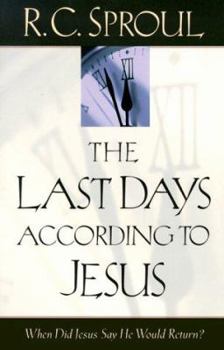The Last Days according to Jesus
Select Format
Select Condition 
Book Overview
Customer Reviews
Rated 1 starsShould be titled LAST DAYS ACCORDING TO THE PRETERIST INTERPRETATION
I bought the book while going through a Bible study of Revelation. I read the book only to discover that the title is misleading. It Is not “The Last Days According to Jesus”. It is a preterist discourse on the subject and should be called, “The The Last Days According to a Preterist Interpretation.” The book deals a lot with the Olivet Discourse (of course) so I have questions. Did ALL the nations mourn as stated in Matthew...
0Report
Rated 5 starsA ground breaking book for making sense out of difficult Bible eschatology
Early on in this book, R.C. Sproul astutely observes that the recorded accounts of Jesus' discourse on the Mount of Olives in the three synoptic gospels can be the most persuasive proof of divinely-inspired fulfilled prophesy due to the amazingly accurate account of the destruction of Jerusalem. Yet at the same time, due to a passage in the Matthew account that alludes to Jesus physically appearing when these events occur,...
0Report
Rated 5 starsImportant part of the prophecy discussion
Regardless whether you agree with his conclusion, Sproul delivers important questions on Jesus statements in Matthew 24, Mark 13, and Luke 21. What did Jesus mean when he said the temple would be destroyed, Jerusalem sacked, and that He would return all before the generation to whom He was speaking would pass away? Sproul argues that we cannot play "linguistic gymnastics" with the meaning of words (i.e. was His predicted return...
0Report
Rated 5 starsGood place to start!
Although I am now a futurist (I was a Full Preterist for 5 years), now disagree with the Preterist take on prophecy, and the timeline mentality prevalent today (I believe we must follow the orthodoxy of the apostles 100% regardless of what time it is, 2 Thess. 2:15) I would recommend reading Sproul and other partial preterist authors as long as it is cautiously. This is a very good place to start, you can see my point why...
0Report
Rated 5 starsVery good introduction to Orthodox Preterism
I must admit, I never heard of preterism before hearing R.C.'s 'Last Days According to Jesus' tape series on the radio a few months ago. But, prior to that R.C. convinced me of his commitment to truth, so I decided to get the book. It brings texts to view from not only Revelation, but also from the Gospels, the Epistles, and the Old Testament. That is something I never thought of doing while I was looking for the rapture...
2Report















